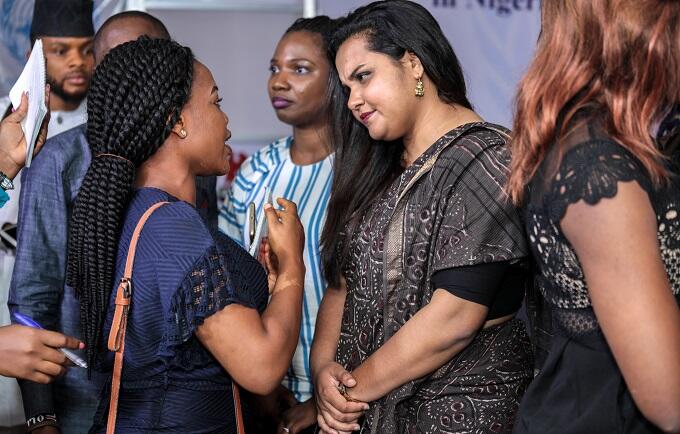Abuja, Nigeria - More than 250 young Nigerians attended the evening for the Sustainable Development Goals (SDG) town hall meeting, and showing tremendous enthusiasm to discuss not only the problems and frustrations they face in realising their potential, but also to have the opportunity to engage with the UN Secretary General’s Youth Envoy, Jayathma Wickramanayake.
Nigeria, Africa’s most populous country of more than 188 million people, has more than 60% of its population below the age of 30 years, who are in-touch with the changing world of work, advancements in information technology – particularly well connected on social media. The evening’s engagement began with an opening remark with the United Nations Resident Representative, Mr. Edward Kallon, who stressed on the fact that young people were the hope of the nation, and today’s leaders who need all the support that they can get.
The Envoy began her opening remark by thanking young Nigerians for their relentless goodwill messages sent to her in anticipation of her coming, and for all the support she has received on social media. The Envoy spoke about her interest not only to learn about the challenges facing young people in the country, but also their solutions, suggestions and recommendations they expected her to take back to the Secretary-General to New York. “I am also confident that this would help add value to my understanding of youth issues around the world,” she added. “Tell me what more I can do, tell me what I can do better.”
Speaking prior to the Youth Envoy was a panel consisting of four young innovators from Nigeria, which touched on two broad themes of health and political participation. These included the engagement in process to develop the 2030 Agenda for Sustainable Development and how Nigerian youth championed youth priorities in the process. Another spoke about what young people in the country are doing to combat child marriage and female genital mutilation by promoting access to services and comprehensive sexuality education. A social enterprise that pushes innovations to increase access to services for young people through information technology was also shared. Political participation looked at young people’s engagement in leadership and decision making.
One of the most important highlights of the evening was on the importance of not leaving people with disability behind. An observation that was made during the Q&A session, by a member of the audience living with disability. If the conversation was about leaving no one behind, the lack of visibility about issues concerning disabled people in Nigeria was “inexcusable and do not advance the UN’s sustainable development agenda.”
Responding to some of the issues raised, the Youth Envoy touched on the disproportionately excluded groups, such as young girls and women, as well as the disabled. She noted that while the Sustainable Development Goals were universal in nature, and applicable to all countries irrespective of geography, there was non the less a need to localise solutions, that is, understanding what works best in each country or community setting, and giving priority to certain groups. Finally, the Youth Envoy mentioned to the young people in the hall that she understands the depth of frustrations young people have to deal with in executing their dreams, but “we have to keep fighting.”


